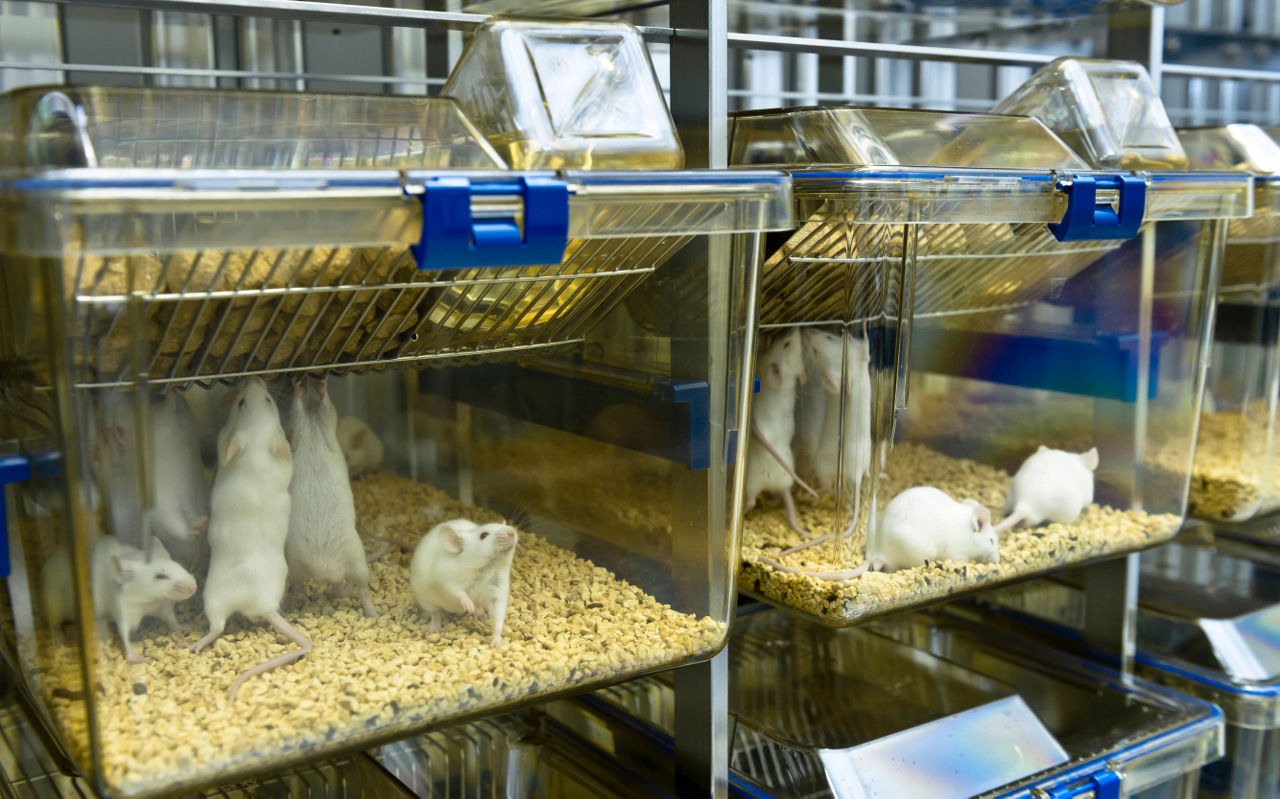Taconic Biosciences' Colony Management Solutions uniquely combines flexible housing options with cross-functional expertise to create a custom breeding program for each customer.
Animal Model Housing

- Microenvironmental Factors
- Macroenvironmental Factors
- Barrier Housing
- Isolator Housing
- Isolator Breeding Solutions (IBS)
- Isolated Barrier Units
Microenvironmental Factors
Each animal's individual cage is controlled to protect their health, reduce stress, and support maximum breeding performance.
Bedding and Enrichment
Appropriate bedding for a model's strain, sex, and phenotype supports health and daily activity. All mice and rats are housed in solid-bottom cages and group-housed unless single housing is required (e.g., due to aggression).
The primary goal of introducing environmental enrichment is to increase animal well-being by providing sensory and motor stimulation through structures and resources that allow the animals to express species-typical behaviors. These behaviors promote psychological well-being through exercise, productive activities, and cognitive challenges that correspond to species-specific characteristics.
Special Housing Requirements
Depending on the phenotype and desired health standard, a model may have more complex housing requirements. Single housing may be required for pregnant animals, animal models with aggressive behaviors, or retired male breeders.
Macroenvironmental Factors
The environment beyond each individual cage is equally important to breeding performance. Our facilities are carefully controlled to provide each colony with the ideal macroenvironmental conditions for animal welfare. Temperature and humidity of the breeding facility can affect stress levels, health, and performance, especially for certain genetically engineered strains. External noises and vibrations are minimized while artificial light and dark cycles are employed to maintain the natural cycle of all animals.

Barrier Housing
Barriers follow a bioexclusion model of biosecurity such that all animals and materials must meet well-defined microbiological criteria prior to entry into the barrier. All animals entering a barrier must first pass through a rederivation and gnotobiotic quarantine procedure in order to meet the health standard of the receiving barrier. Alternatively, animals already housed in a barrier may move to another barrier of equal or lower health standard after evaluation by Taconic's Veterinary Sciences department.
Benefits
- Most appropriate for large-scale and/or long-term production breeding
- Best option for breeding projects that are expected to fluctuate in size in response to the supported research program
- Cost-effective option for longer-term biosecure housing needs as all health monitoring fees are included in the weekly cage price
Isolator Housing
Isolators follow a biocontainment model of biosecurity such that the health status of the animals in the isolator is maintained at status quo relative to their initial arrival and population of the isolator. Post arrival, animals can be held at a health standard equivalent to Taconic's Murine Pathogen-Free (MPF), Opportunist-Free (OF), Germ-Free (GF), or customer-defined health designations.
Benefits
- Allows for direct importation of animals from outside sources without the need for rederivation; hence, breeding can begin shortly after arrival
- Isolators are most appropriate for quick start-up and small-scale breeding to accelerate the delivery of study cohorts for initial screening and/or proof-of-principle type studies
- Allows for the administration of custom diets and water
Isolator Breeding Solutions (IBS)
Isolator Breeding Solutions (IBS) is an AAALAC-accredited operation located in Taconic's state-of-the-art facilities in Rensselaer, NY and Ejby, DK. Animals are housed in semi-rigid isolators capable of housing whole breeding colonies, and each is equipped with a dedicated filtered air supply. Once the health reports for your animals are approved, we can import your colony directly into IBS and begin breeding immediately.
A list of non-tolerated organisms can be found here.
Benefits
- IBS is the ideal choice when speed to cohort is critical
- Animals that meet minimal health criteria may be imported directly into the IBS Facility - no rederivation is required
- One year of historical health monitoring results are required to gain approval for entry
- Health monitoring may be customized to meet your needs and budget
- The eTACONIC® platform provides real-time access to breeding, inventory data, and health reports
- Flexibility for special services such as administration of custom diets, compound administration, and special monitoring
Isolated Barrier Units (IBUs)
Taconic Isolated Barrier Units (IBU) are AAALAC-accredited, independent vivaria. All animals entering an IBU must be offspring of a rederivation and have gone through gnotobiotic quarantine with comprehensive health monitoring or originate from a comparable Taconic IBU. The IBU is designed to prevent microbial cross-contamination between colonies via separation of barrier units.
Benefits
- Ideal choice for breeding colonies that are relatively large in size or anticipated for use over a longer period of time (e.g., >1 year)
- Animals carry the Taconic Murine Pathogen Free (MPF) health standard
- All health monitoring services are included and health monitoring data may be accessed via the eTACONIC® platform or our health reporting webpages
















.jpg)

.jpg)
.jpg)
.jpg)
.jpg)





.jpg)


.jpg)
.jpg)




.jpg)




.jpg)

.jpg)





